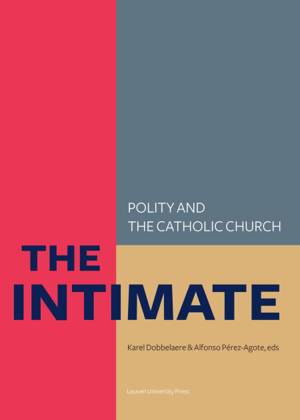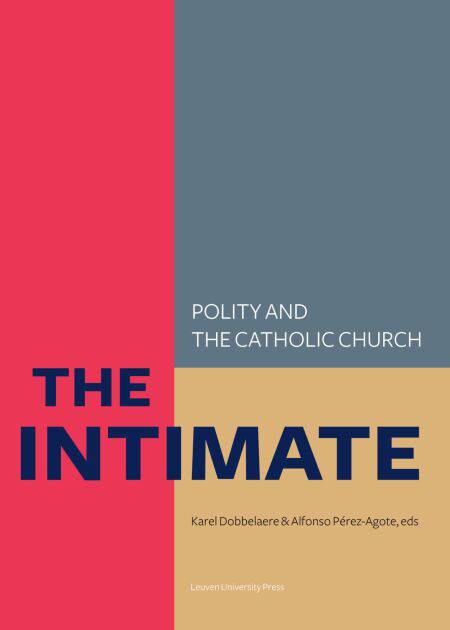
Bedankt voor het vertrouwen het afgelopen jaar! Om jou te bedanken bieden we GRATIS verzending (in België) aan op alles gedurende de hele maand januari.
- Afhalen na 1 uur in een winkel met voorraad
- In januari gratis thuislevering in België
- Ruim aanbod met 7 miljoen producten
Bedankt voor het vertrouwen het afgelopen jaar! Om jou te bedanken bieden we GRATIS verzending (in België) aan op alles gedurende de hele maand januari.
- Afhalen na 1 uur in een winkel met voorraad
- In januari gratis thuislevering in België
- Ruim aanbod met 7 miljoen producten
Zoeken
The intimate. polity and the catholic church E-BOOK
laws about life, death and the family in so-called catholic countries
€ 29,50
+ 29 punten
Omschrijving
The waning influence of the Catholic church in the ethical and political debate.
For centuries the Catholic Church was able to impose her ethical rules in matters related to the intimate, that is, questions concerning life (from its beginning until its end) and the family, in the so-called Catholic countries in Western Europe. When the polity started to introduce legislation that was in opposition to the Catholic ethic, the ecclesiastical authorities and part of the population reacted. The media reported massive manifestations in France against same-sex marriages and in Spain against the de-penalization of abortion. In Italy the Episcopal conference entered the political field in opposition to the relaxation of several restrictive legal rules concerning medically assisted procreation and exhorted the voters to abstain from voting so that the referendum did not obtain the necessary quorum. In Portugal, to the contrary, the Church made a "pact" with the prime minister so that the law on same-sex marriages did not include the possibility of adoption. And in Belgium the Episcopal conference limited its actions to clearly expressing with religious, legal, and anthropological arguments its opposition to such laws, which all other Episcopal conferences did also.
In this book, the authors analyse the full spectrum of the issue, including the emergence of such laws; the political discussions; the standpoints defended in the media by professionals, ethicists, and politicians; the votes in the parliaments; the political interventions of the Episcopal conferences; and the attitude of professionals. As a result the reader understands what was at stake and the differences in actions of the various Episcopal conferences. The authors also analyse the pro and con evaluations among the civil population of such actions by the Church. Finally, in a comparative synthesis, they discuss the public positions taken by Pope Francis to evaluate if a change in Church policy might be possible in the near future.
Research by GERICR (Groupe européen de recherche interdisciplinaire sur le changement religieux), a European interdisciplinary research group studying religious changes coordinated by Alfonso Pérez-Agote.
Contributors:
Céline Béraud (Université de Caen), Karel Dobbelaere (KU Leuven/University of Antwerp), Annalisa Frisina (Università degli Studi di Padova), Franco Garelli (Università degli Studi di Torino), Antonio Montañés (Universidad Complutense de Madrid), Maria João Oliveira (University of Porto), Enzo Pace (Università degli Studi di Padova), Alfonso Pérez-Agote (University Complutense of Madrid), Philippe Portier (École pratique des hautes études, Paris-Sorbonne), Jose Santiago (Universidad Complutense de Madrid), Roberto Francesco Scalon (Università degli Studi di Torino), Helena Vilaça (University of Porto), Liliane Voyé (Université Catholique de Louvain)
For centuries the Catholic Church was able to impose her ethical rules in matters related to the intimate, that is, questions concerning life (from its beginning until its end) and the family, in the so-called Catholic countries in Western Europe. When the polity started to introduce legislation that was in opposition to the Catholic ethic, the ecclesiastical authorities and part of the population reacted. The media reported massive manifestations in France against same-sex marriages and in Spain against the de-penalization of abortion. In Italy the Episcopal conference entered the political field in opposition to the relaxation of several restrictive legal rules concerning medically assisted procreation and exhorted the voters to abstain from voting so that the referendum did not obtain the necessary quorum. In Portugal, to the contrary, the Church made a "pact" with the prime minister so that the law on same-sex marriages did not include the possibility of adoption. And in Belgium the Episcopal conference limited its actions to clearly expressing with religious, legal, and anthropological arguments its opposition to such laws, which all other Episcopal conferences did also.
In this book, the authors analyse the full spectrum of the issue, including the emergence of such laws; the political discussions; the standpoints defended in the media by professionals, ethicists, and politicians; the votes in the parliaments; the political interventions of the Episcopal conferences; and the attitude of professionals. As a result the reader understands what was at stake and the differences in actions of the various Episcopal conferences. The authors also analyse the pro and con evaluations among the civil population of such actions by the Church. Finally, in a comparative synthesis, they discuss the public positions taken by Pope Francis to evaluate if a change in Church policy might be possible in the near future.
Research by GERICR (Groupe européen de recherche interdisciplinaire sur le changement religieux), a European interdisciplinary research group studying religious changes coordinated by Alfonso Pérez-Agote.
Contributors:
Céline Béraud (Université de Caen), Karel Dobbelaere (KU Leuven/University of Antwerp), Annalisa Frisina (Università degli Studi di Padova), Franco Garelli (Università degli Studi di Torino), Antonio Montañés (Universidad Complutense de Madrid), Maria João Oliveira (University of Porto), Enzo Pace (Università degli Studi di Padova), Alfonso Pérez-Agote (University Complutense of Madrid), Philippe Portier (École pratique des hautes études, Paris-Sorbonne), Jose Santiago (Universidad Complutense de Madrid), Roberto Francesco Scalon (Università degli Studi di Torino), Helena Vilaça (University of Porto), Liliane Voyé (Université Catholique de Louvain)
Specificaties
Betrokkenen
- Uitgeverij:
Inhoud
- Aantal bladzijden:
- 224
- Taal:
- Engels
- Reeks:
Eigenschappen
- Productcode (EAN):
- 9789461662118
- Verschijningsdatum:
- 17/05/2017
- Uitvoering:
- E-book
- Beveiligd met:
- Digital watermarking
- Formaat:

Alleen bij Standaard Boekhandel
+ 29 punten op je klantenkaart van Standaard Boekhandel
Beoordelingen
We publiceren alleen reviews die voldoen aan de voorwaarden voor reviews. Bekijk onze voorwaarden voor reviews.








